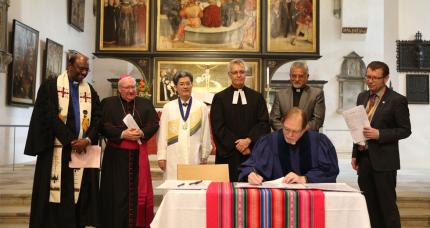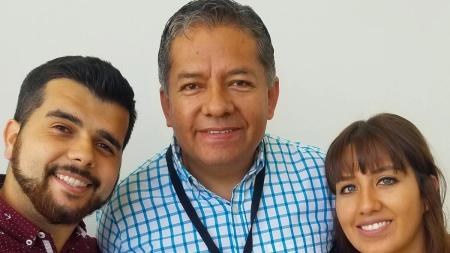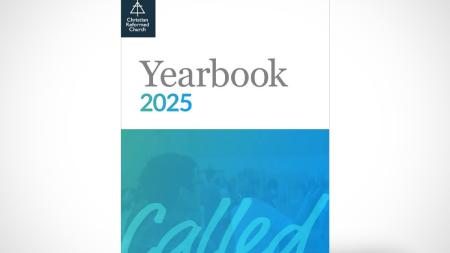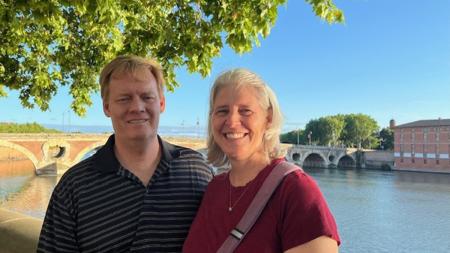Historic Agreements Signed in Wittenberg

Church leaders signed two important ecumenical documents at a ceremony in Wittenberg, Germany.
World Communion of Reformed Churches
Rev. William Koopmans said he was grateful to be part of a worship ceremony that took place on July 5 in Wittenberg’s Stadtkirche (Town Church), in which Martin Luther used to preach.
At this ceremony the World Communion of Reformed Churches (WCRC) signed the Joint Declaration on the Doctrine of Justification, thus committing with the Lutheran World Federation, the United Methodist Council, and the Roman Catholic Church worldwide to overcome divisions that have proliferated between Protestants and Catholics since the 16th-century Reformation.
“Building on their shared affirmation of the basic truths of the doctrine of justification, Catholics, Lutherans, Methodists and Reformed commit themselves to strive together for the deepening of their common understanding of justification in theological study, teaching and preaching,” says the statement signed this week.
In addition, at the same gathering on July 5, the WCRC and the Lutheran Worldwide Federation signed a document titled the Wittenberg Witness, committing the groups to strengthen cooperation and joint action throughout the church of Christ worldwide.
“It was a wonderful opportunity for all of us,” said Koopmans, pastor of Grace Christian Reformed Church in Chatham, Ont., and one of seven members of the CRC’s Ecumenical and Interfaith Relations Committee who are in Leipzig, Germany, this week to take part in the 2017 General Council meeting of the WCRC, which meets every seven years.
Koopmans said signing these documents build “upon the steps towards unity taken by our member churches around the world and upon decades of theological dialogues whose fruits we claim.”
The WCRC General Council is meeting in Germany because 2017 is the 500th anniversary year of the Protestant Reformation, sparked by the ideas of Luther in Wittenberg, Germany, and by other church leaders such as John Calvin.
“Today [July 5] is a historic day,” said Jerry Pillay, president of the WCRC. “The documents we are signing today are significant and symbolic of the road we are to travel.”
In signing the Joint Declaration on the Doctrine of Justification, the WCRC, which includes more than 225 Protestant churches worldwide, formally associated itself with the commitments of this document originally signed by the Lutheran World Federation and the Roman Catholic Church on Oct. 31, 1999.
“Catholics and Lutherans stated that a ‘consensus in basic truths exists between Lutherans and Catholics’ in regard to the theological controversy which was a major cause of the split in the Western church in the 16th century,” said Bishop Brian Farrell, secretary of the Vatican’s Pontifical Council for Promoting Christian Unity, during in the ceremony.
The declaration points out that mutual condemnations pronounced during the Reformation do not apply to their teaching today on justification, which emphasizes how God “justifies” people through the finished work of Jesus Christ, crediting believers with the righteousness of Jesus himself (Rom. 3-4).
“The present achievement and commitment are viewed by Catholics, Lutherans, Methodists, and Reformed as part of their pursuit of the full communion and common witness to the world, which is the will of Christ for all Christians,” said World Methodist Council president Jong Chun Park.
And in signing the Wittenberg Witness, pledging to strengthen cooperation and joint action between the WCRC and the Lutheran World Federation, LWF general secretary Martin Junge said, “We commit ourselves to redouble our common efforts to embody our unity, together resisting the forces of injustice and exclusion.”
At the worship service there were prayers of repentance and lamentation for past divisions and wrongs, and commitments to work for unity and justice.
“The Reformation taught us accountability,” said Rev. Najla Kassab from Lebanon in her sermon during the service. Kassab is an ordained minister in the National Evangelical Synod of Syria and Lebanon.
“Wherever we are in the church, we are held accountable,” she said. “Today we are reminded of Luther’s words from his pulpit: ‘A religion that gives nothing, costs nothing, and suffers nothing, is worth nothing.’”


